Unit 1 We've got lots of apples课文重难点(复习课件,附练习)(共24张PPT)
文档属性
| 名称 | Unit 1 We've got lots of apples课文重难点(复习课件,附练习)(共24张PPT) |

|
|
| 格式 | ppt | ||
| 文件大小 | 399.5KB | ||
| 资源类型 | 教案 | ||
| 版本资源 | 外研版 | ||
| 科目 | 英语 | ||
| 更新时间 | 2022-06-22 16:22:47 | ||
图片预览

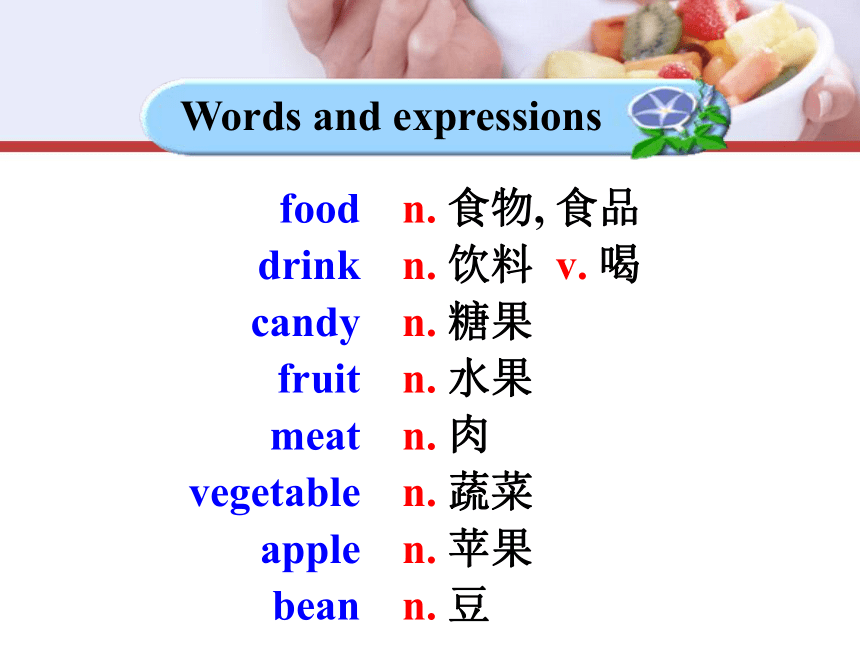
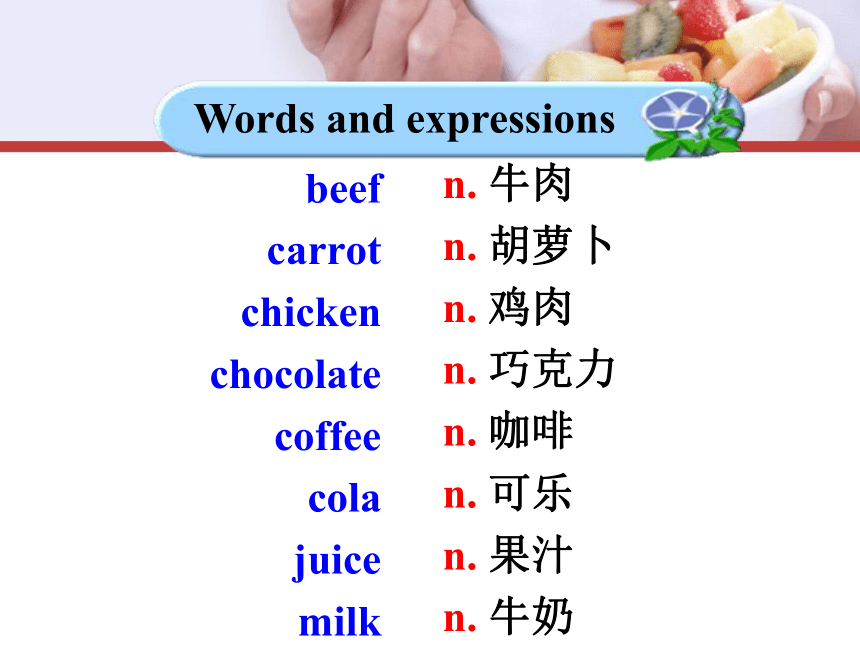
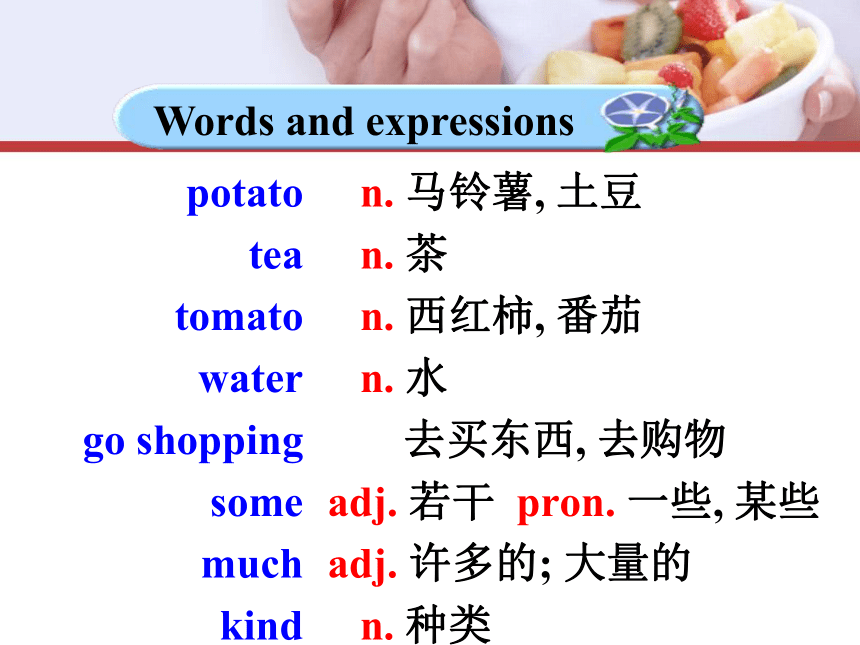

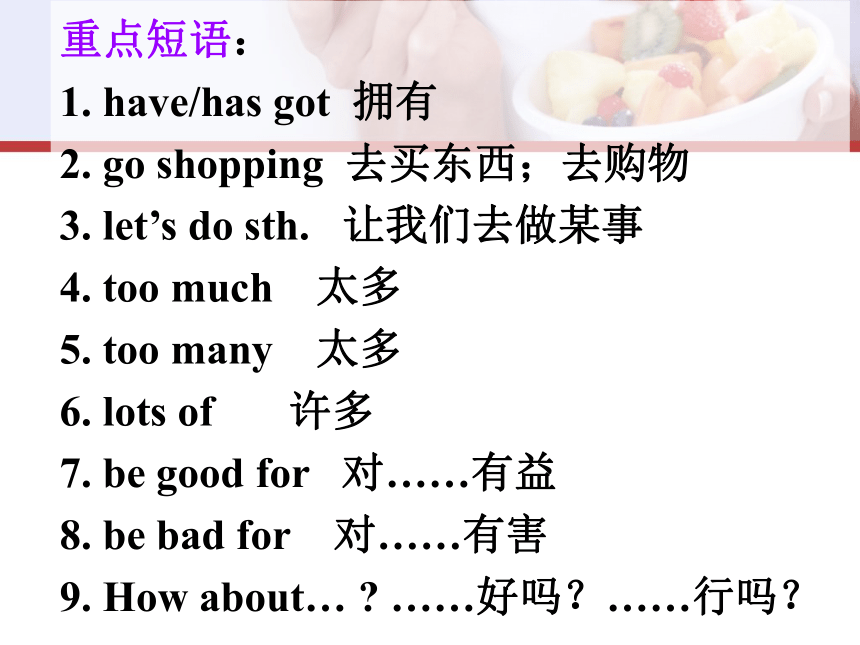
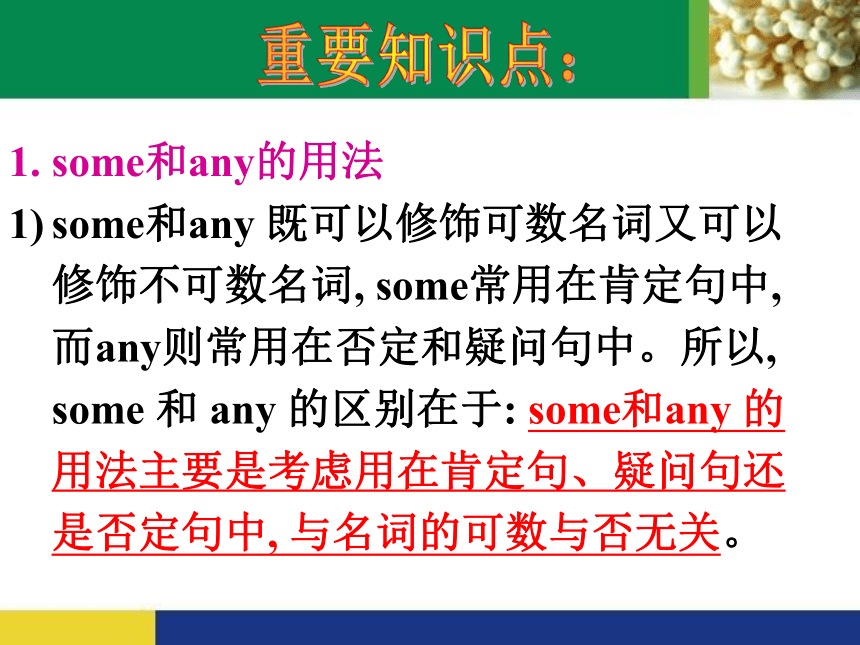
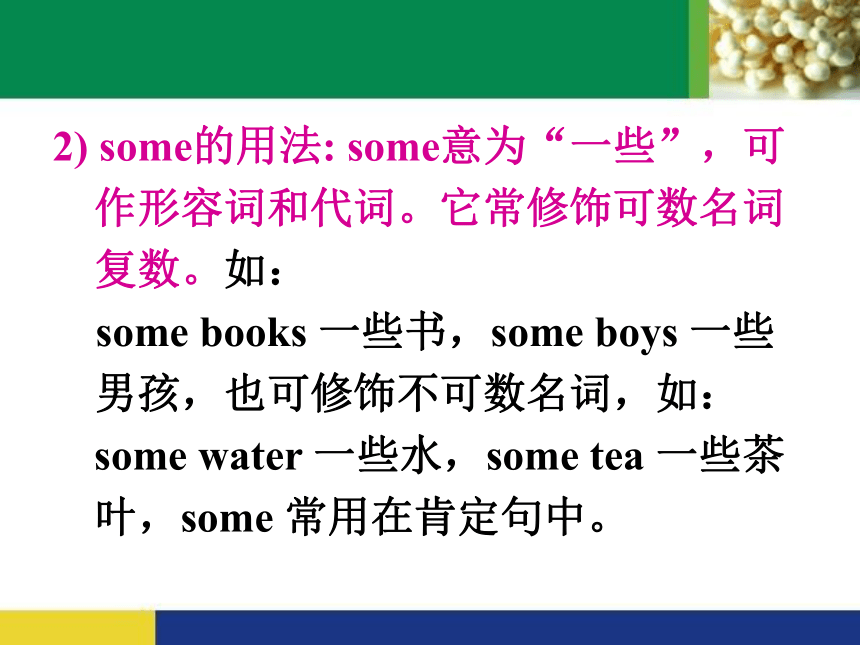
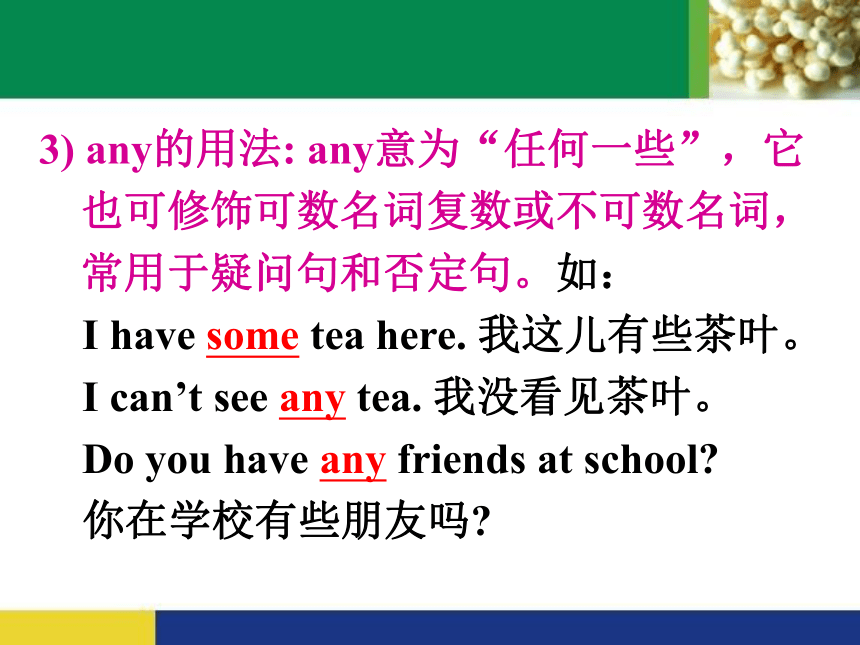
文档简介
(共24张PPT)
Unit1
课文重难点
food
drink
candy
fruit
meat
vegetable
apple
bean
n. 食物, 食品
n. 饮料 v. 喝
n. 糖果
n. 水果
n. 肉
n. 蔬菜
n. 苹果
n. 豆
Words and expressions
beef
carrot
chicken
chocolate
coffee
cola
juice
milk
n. 牛肉
n. 胡萝卜
n. 鸡肉
n. 巧克力
n. 咖啡
n. 可乐
n. 果汁
n. 牛奶
Words and expressions
potato
tea
tomato
water
go shopping
some
much
kind
n. 马铃薯, 土豆
n. 茶
n. 西红柿, 番茄
n. 水
去买东西, 去购物
adj. 若干 pron. 一些, 某些
adj. 许多的; 大量的
n. 种类
Words and expressions
本课时主要句型
课后回顾
Let’s go shopping for …
How about …
— Have we got any …
— Yes, we’ve got some …
— No, we haven’t.
We haven’t got any …
重点短语:
1. have/has got 拥有
2. go shopping 去买东西;去购物
3. let’s do sth. 让我们去做某事
4. too much 太多
5. too many 太多
6. lots of 许多
7. be good for 对……有益
8. be bad for 对……有害
9. How about… ……好吗?……行吗?
1. some和any的用法
some和any 既可以修饰可数名词又可以修饰不可数名词, some常用在肯定句中, 而any则常用在否定和疑问句中。所以, some 和 any 的区别在于: some和any 的用法主要是考虑用在肯定句、疑问句还是否定句中, 与名词的可数与否无关。
2) some的用法: some意为“一些”,可作形容词和代词。它常修饰可数名词复数。如:
some books 一些书,some boys 一些男孩,也可修饰不可数名词,如:some water 一些水,some tea 一些茶叶,some 常用在肯定句中。
3) any的用法: any意为“任何一些”,它也可修饰可数名词复数或不可数名词,常用于疑问句和否定句。如:
I have some tea here. 我这儿有些茶叶。
I can’t see any tea. 我没看见茶叶。
Do you have any friends at school
你在学校有些朋友吗
4) 但在表示建议,反问,请求的疑问句中,或期望得到肯定回答时,多用some而不用any。如:
Would you like some coffee 你要不要来点咖啡
How about some fruit juice 来点水果汁如何
5) 当any表示“任何”的意义,起强调作用时,它可以用在肯定句中;
Any student can answer this question.
任何学生都可以回答这个问题。
2. many, much, lots of 的用法:
1) many 许多,用来修饰可数名词,例如:
Are there many students in his class
他的班上有很多学生吗?
I haven’t got many English books.
我没有很多英语书。
2) much许多 用来修饰不可数名词,如:
We haven’t got much work to do.
我们没有太多工作要做。
Is there much milk in the bottle
瓶子里有很多牛奶吗?
3) lots of = a lot of 许多,它既可以修饰可数名词,相当于many;也可以修饰不可数名词,相当于much,例如:
There are lots of apples on the desk.
桌子上有很多苹果。
We have got lots of meat at home.
我们家里有许多肉。
3. too much 和 too many 的用法:
too much 和 too many 都表示“太多”。
1) too much + 不可数名词 ,例如:
We have too much work to do.
我们有太多的工作要做。
2) too many + 可数名词,例如:
There are too many students in our class. 我们班上有太多的学生。
4. healthy food健康的饮食
healthy是以health为词根派生出的形容词。我们以名词health为词根, 可以派生出形容词healthy, 副词healthily, 也可以在形容词healthy之前加前缀-un, 构成反义词unhealthy,意为“不健康的”。
His grandfather is in good health.
他祖父身体健康。
We have to eat and drink healthily.
我们必须健康地饮食。
Is Coke an unhealthy drink
可乐是一种不健康的饮料吗
5. Too much chocolate isn’t good for you.
吃太多巧克力对你没有好处。
be good for 的意思是“对……有好处”,它的反义词组是be bad for, 如:
Watching too much TV isn’t good for you.
电视看得太多对你不好。
Smoking is bad for your health.
吸烟有害你的健康。
6. All right, … 好的,……
这里的all right表示同意别人所说的事情。
— I think you should start now.
我认为你应该现在开始了。
— All right. 好的。
all right 可以有多种含义,用于多种场合。Tom, you will lock the door, all right
汤姆,你来锁门,好吗?
上句中的all right 我们可以译为“明白了吗?是吧?对吧?”等,表示向对方确认他会同意或理解你所说的话。
Let’s go shopping for food and _______
(饮料).
2. We haven’t got any _______ (肉).
3. Let’s get some _______ (鸡肉).
4. Have you got _____ (一些) chocolate
5. What _______ (种类) of fruit do you
like best
6. Let’s get some ______ (咖啡) for mum.
drink
meat
chicken
any
kind
coffee
7. How about some apple _______ (果汁)
8. There are lots of _________ (西红柿)
in the basket.
B. 按要求改写句子:
1. There is some fish on the plate.
(改为否定句)
2. We have got some oranges.
(改为一般疑问句)
There isn’t any fish on the plate.
Have you got any oranges
tomatoes
juice
3. They have got some milk and water.
(改为否定句)
4. There is a tomato on the table.
(改为复数形式)
5. He has got a potato.(改为复数形式)
They haven’t got any milk or water.
There are some tomatoes on the table.
They have got some potatoes.
C. 完成句子:
1. 吃太多巧克力对你不好。
Eating too much chocolate
_____________________ you.
2.我通常星期天购物。
I usually ___________ on Sundays.
isn’t good for/ is bad for
go shopping
3. 买些土豆怎样?
___________ buying some _________
4. 我们没有水果了,让我们去买些吧。
We ______________ fruit, so let’s ________.
5. 他爸爸有许多好朋友。
His father __________________ good friends.组卷网
has got lots of / many
haven’t got any
How about potatoes
get some
Unit1
课文重难点
food
drink
candy
fruit
meat
vegetable
apple
bean
n. 食物, 食品
n. 饮料 v. 喝
n. 糖果
n. 水果
n. 肉
n. 蔬菜
n. 苹果
n. 豆
Words and expressions
beef
carrot
chicken
chocolate
coffee
cola
juice
milk
n. 牛肉
n. 胡萝卜
n. 鸡肉
n. 巧克力
n. 咖啡
n. 可乐
n. 果汁
n. 牛奶
Words and expressions
potato
tea
tomato
water
go shopping
some
much
kind
n. 马铃薯, 土豆
n. 茶
n. 西红柿, 番茄
n. 水
去买东西, 去购物
adj. 若干 pron. 一些, 某些
adj. 许多的; 大量的
n. 种类
Words and expressions
本课时主要句型
课后回顾
Let’s go shopping for …
How about …
— Have we got any …
— Yes, we’ve got some …
— No, we haven’t.
We haven’t got any …
重点短语:
1. have/has got 拥有
2. go shopping 去买东西;去购物
3. let’s do sth. 让我们去做某事
4. too much 太多
5. too many 太多
6. lots of 许多
7. be good for 对……有益
8. be bad for 对……有害
9. How about… ……好吗?……行吗?
1. some和any的用法
some和any 既可以修饰可数名词又可以修饰不可数名词, some常用在肯定句中, 而any则常用在否定和疑问句中。所以, some 和 any 的区别在于: some和any 的用法主要是考虑用在肯定句、疑问句还是否定句中, 与名词的可数与否无关。
2) some的用法: some意为“一些”,可作形容词和代词。它常修饰可数名词复数。如:
some books 一些书,some boys 一些男孩,也可修饰不可数名词,如:some water 一些水,some tea 一些茶叶,some 常用在肯定句中。
3) any的用法: any意为“任何一些”,它也可修饰可数名词复数或不可数名词,常用于疑问句和否定句。如:
I have some tea here. 我这儿有些茶叶。
I can’t see any tea. 我没看见茶叶。
Do you have any friends at school
你在学校有些朋友吗
4) 但在表示建议,反问,请求的疑问句中,或期望得到肯定回答时,多用some而不用any。如:
Would you like some coffee 你要不要来点咖啡
How about some fruit juice 来点水果汁如何
5) 当any表示“任何”的意义,起强调作用时,它可以用在肯定句中;
Any student can answer this question.
任何学生都可以回答这个问题。
2. many, much, lots of 的用法:
1) many 许多,用来修饰可数名词,例如:
Are there many students in his class
他的班上有很多学生吗?
I haven’t got many English books.
我没有很多英语书。
2) much许多 用来修饰不可数名词,如:
We haven’t got much work to do.
我们没有太多工作要做。
Is there much milk in the bottle
瓶子里有很多牛奶吗?
3) lots of = a lot of 许多,它既可以修饰可数名词,相当于many;也可以修饰不可数名词,相当于much,例如:
There are lots of apples on the desk.
桌子上有很多苹果。
We have got lots of meat at home.
我们家里有许多肉。
3. too much 和 too many 的用法:
too much 和 too many 都表示“太多”。
1) too much + 不可数名词 ,例如:
We have too much work to do.
我们有太多的工作要做。
2) too many + 可数名词,例如:
There are too many students in our class. 我们班上有太多的学生。
4. healthy food健康的饮食
healthy是以health为词根派生出的形容词。我们以名词health为词根, 可以派生出形容词healthy, 副词healthily, 也可以在形容词healthy之前加前缀-un, 构成反义词unhealthy,意为“不健康的”。
His grandfather is in good health.
他祖父身体健康。
We have to eat and drink healthily.
我们必须健康地饮食。
Is Coke an unhealthy drink
可乐是一种不健康的饮料吗
5. Too much chocolate isn’t good for you.
吃太多巧克力对你没有好处。
be good for 的意思是“对……有好处”,它的反义词组是be bad for, 如:
Watching too much TV isn’t good for you.
电视看得太多对你不好。
Smoking is bad for your health.
吸烟有害你的健康。
6. All right, … 好的,……
这里的all right表示同意别人所说的事情。
— I think you should start now.
我认为你应该现在开始了。
— All right. 好的。
all right 可以有多种含义,用于多种场合。Tom, you will lock the door, all right
汤姆,你来锁门,好吗?
上句中的all right 我们可以译为“明白了吗?是吧?对吧?”等,表示向对方确认他会同意或理解你所说的话。
Let’s go shopping for food and _______
(饮料).
2. We haven’t got any _______ (肉).
3. Let’s get some _______ (鸡肉).
4. Have you got _____ (一些) chocolate
5. What _______ (种类) of fruit do you
like best
6. Let’s get some ______ (咖啡) for mum.
drink
meat
chicken
any
kind
coffee
7. How about some apple _______ (果汁)
8. There are lots of _________ (西红柿)
in the basket.
B. 按要求改写句子:
1. There is some fish on the plate.
(改为否定句)
2. We have got some oranges.
(改为一般疑问句)
There isn’t any fish on the plate.
Have you got any oranges
tomatoes
juice
3. They have got some milk and water.
(改为否定句)
4. There is a tomato on the table.
(改为复数形式)
5. He has got a potato.(改为复数形式)
They haven’t got any milk or water.
There are some tomatoes on the table.
They have got some potatoes.
C. 完成句子:
1. 吃太多巧克力对你不好。
Eating too much chocolate
_____________________ you.
2.我通常星期天购物。
I usually ___________ on Sundays.
isn’t good for/ is bad for
go shopping
3. 买些土豆怎样?
___________ buying some _________
4. 我们没有水果了,让我们去买些吧。
We ______________ fruit, so let’s ________.
5. 他爸爸有许多好朋友。
His father __________________ good friends.组卷网
has got lots of / many
haven’t got any
How about potatoes
get some
同课章节目录
- Starte
- Module 1 My teacher and my friends
- Module 2 My English lesson
- Module 3 My English book
- Module 4 My everyday life
- Module 1 My classmates
- Unit 1 Nice to meet you.
- Unit 2 I'm Wang Lingling and I'm thirteen years ol
- Unit 3 Language in use.
- Module 2 My family
- Unit 1 Is this your mum?
- Unit 2 These are my parents.
- Unit 3 Language in use.
- Module 3 My school
- Unit 1 There are thirty students in my class.
- Unit 2 The library is on the left of the playgroun
- Unit 3 Language in use.
- Module 4 Healthy food
- Unit 1 We've got lots of apples.
- Unit 2 Is your food and drink healthy?
- Unit 3 Language in use.
- Module 5 My school day
- Unit 1 I love history.
- Unit 2 We start work at nine o'clock.
- Unit 3 Language in use.
- Revision module A
- Module 6 A trip to the zoo
- Unit 1 Does it eat meat?
- Unit 2 The tiger lives in Asia.
- Unit 3 Language in use.
- Module 7 Computers
- Unit 1 How do I write my homework on the computer?
- Unit 2 When do you use a computer?
- Unit 3 Language in use.
- Module 8 Choosing presents
- Unit 1 I always like birthday parties.
- Unit 2 She often goes to concerts.
- Unit 3 Language in use.
- Module 9 People and places
- Unit 1 We're enjoying the school trip a lot.
- Unit 2 They're waiting for buses or trains.
- Unit 3 Language in use.
- Module 10 Spring Festival
- Unit 1 Are you getting ready for Spring Festival?
- Unit 2 My mother's cleaning our houses and sweepin
- Unit 3 Language in use.
- Revision module B
